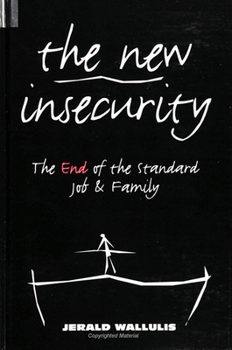The New Insecurity: The End of the Standard Job and Family
Examines the impact of the loss of expectations of permanent employment and enduring family relationships on individuals today and explores how changes in the collective endeavor to provide security could help.
Since 1973, the median family income in the United States has remained static, in marked contrast to the period from 1947 to 1973, when it actually doubled. Downsizing and corporate restructuring have produced widespread worries about employment, health-care coverage, and pension benefits. The American dream of a well-paid, permanent job, upward mobility, secure home ownership, and greater prosperity for one's children is for many today a remote, even romantic notion. Perhaps equally unrealistic is the expectation of sharing the American dream with the same marriage partner for all of one's adulthood.
The New Insecurity contrasts this new insecurity with a more secure past, when there were career ladders, factories stayed at home, and marriages lasted. But it also places it in a wider historical context, tracing it back to the docile bodies of Michel Foucault and the constant minds of Gerhard Oestreich at the very beginnings of the modern army. "Fight, don't flee," the command given then, has changed, according to the advice of business manuals today, to "don't stay too long" and "keep your options open." Jerald Wallulis offers a framework for understanding this individual uncertainty, arguing that today's challenges to traditional life planning are not momentary, nor will the free-floating economic anxiety disappear when the next "real" economic recovery comes.
But Wallulis also makes the case that the envied security of past generations did not depend on their prospects for long-term, full-time employment alone. It was also made possible by the development of social insurance programs designed to provide protection against unemployment, disability, and old-age indigency. This book emphasizes the contribution of the "insurance state" to the achievement of individual security and explores how programs of income assistance could protect the individual against the strong income fluctuations so prevalent in the new job market.





